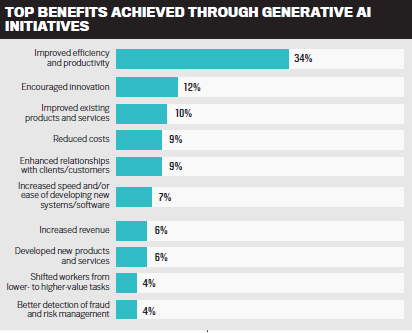Industry leaders discuss how AI can be harnessed

When a new technology emerges that has the potential for paradigm change, there is a tendency for the initial applications to be bound by concepts and thought processes that dominated the old framework. This is sometimes referred to as the ‘radio with pictures’ problem.
Television shows in the late 1940s treated the new medium much like radio: shows were essentially filmed versions of radio programs with monologues, hosts introducing acts and no visual experimentation. It wasn’t until the 1950s that camera angles, editing, location shooting and special effects showed that TV could more deeply engage audiences through sight, sound and movement.
Today’s paradigm-changing technology that the lending world is yet to leverage to its true potential is, of course, artificial intelligence. Recent technology gives mortgage brokers the power to supercharge their service by harnessing cutting-edge technology.
Less paperwork, faster loan approvals and deeper customer engagement are the rewards for brokers who get the formula right. Be it a chatbot delivering instant policy answers, or AI summarising client calls in minutes, examples exist of win-win results for both brokers and their clients through the new technology. Yet despite the potential, the implementation of such tools remains inconsistent in Australia.
“At this stage the Australian industry has not advanced as much as some like to think,” says FBAA managing director Peter White (pictured above right).
White points out that there are barriers to implementing efficiency-driving technologies in the industry.
“It doesn’t greatly enhance the processes right now, which is why the FBAA has been talking to Treasury, who want to make the process digital. The technology exists to drive efficiencies; as an example, we need to transition from wet-ink signatures to digital signatures.
“[AI] technology makes our brokers and associates more efficient and unlocks greater capability to provide accurate and express responses to customers”
A good role model
These new tools can speed up the lending process and help reshape the nature of brokerclient relationships, saving time and money.
One firm converting new tech into tangible benefits is Lendi Group.
“Aussie and Lendi brokers around the country are leveraging our technology to great effect,” says Travis Tyler (pictured above right), Lendi Group’s chief product officer. “Industry data indicates that the average loan takes more than 20 hours of broker input. Our technology platform unlocks efficiencies that are seeing our brokers achieve lodgement speeds more than four times faster than the industry average.”
This improvement in efficiency has farreaching benefits for both brokers and clients. Other industries are already seeing significant bottom-line improvements, with a recent global study by Deloitte showing improved efficiency and productivity in 34% of enterprises that introduced AI initiatives.
Lendi Group has been able to create a time dividend for brokers by simplifying its processes. Automated document verification, instant credit checks and AI-driven risk assessments are dramatically reducing turnaround times.
“[Our platform] benefits brokers by adding capacity and time they can spend directly interacting with customers and focusing on revenue-generating activity, while customers benefit by getting into their new home sooner,” says Tyler.
A recent innovation exemplifies this trend: “One of our more recent tech developments is the Aussie mobile app, which launched earlier this year. This app has put our brokers in the palms of their customers and facilitated ease of engagement like never before. Our brokers have embraced the app with enthusiasm, and sentiment from the network has been very positive.”
The response to these innovations has been positive, extending beyond brokers to end users. “Reviews on the Apple and Android platforms have also been very positive, which indicates customers are receptive to the new value we’re delivering,” says Tyler.
In short, businesses that get it right are using technology to convert more time into money for themselves and for customers.
What’s holding progress back?
The reasons for the slow adoption by other players in the industry are complex and multifaceted. White suggests that some financial institutions may be resistant to change due to potential impacts on their business models.
“The banks have been reluctant in many ways to embrace this because they have entire retention teams who want to steal business from brokers, and new technology will make this more difficult. So at this stage the first step has not been taken.”
But he also warns of the potential pitfalls of rushed adoption, particularly when it comes to AI. “Brokers are starting to use it, but it’s a little dangerous if they don’t know how to use it for optimal outcomes or if they rely too much on it at this stage. It’s in the infancy growth phase,” he says.
Personal branding, the human touch
Even so, there are companies with a focus on tech that are increasing their competitiveness by leveraging new tools to boost their personal
branding, for example.
“For smaller brokers, it’s more about your personal branding than the company branding. Brokers who can leverage different social channels to promote themselves and share their story can do well competing with the bigger players, which is a game changer,” says Bill Tsouvalas, founder and managing director of tech-focused asset finance broker Savvy.
Understanding platform-specific strategies is also essential, he says. “One mistake we see repeating itself is people using the exact same content and approach for each platform ... It’s better to make platform-specific content and really focus on one or two channels exclusively.”
Keeping the human element in broking is also crucial.
“We pride ourselves on our human-led, tech-superpowered approach to mortgage broking, where our technology enhances, rather than replaces, human connection,” says Tyler. “Our technology gives our customers greater choice around how they engage with their broker; [it] facilitates speed and efficiency for our brokers and ultimately leads to faster and more desirable outcomes for brokers and customers alike.”
Tsouvalas agrees that AI will not replace the human element. “At the end of the day,” he says, “mortgage broking is all about the customer relationship ... I don’t see AI replacing this any time soon, if at all.”
The integration of technology into a brokerage is also about inclusivity. Tyler explains how Lendi’s approach helps serve a diverse customer base: “Lendi Group is home to two brands, over 1,300 brokers and 220 retail stores. Our proprietary technology platform is the nerve centre of our broker solution, allowing us to deliver our services in a truly omnichannel way.”

The AI revolution present and future
The stakes are high for getting the implementation of technology right, and challenges are rife.
Data security concerns loom large, as evidenced by the rising incidence of financial crimes involving digital payments. According to a recent LexisNexis Risk Solutions study, 46% of organisations reported an 11–20% increase in such crimes over the past year, while a further 19% reported more than a 20% increase.
Mitigating these risks requires a multifaceted approach. Robust cybersecurity measures, regular staff training, and adherence to stringent data protection protocols are crucial. The 2024 Thales Data Threat Report indicates that external attackers and human error remain the top data threat actors, underscoring the need for both technological and human-centric solutions.
This is all the more important given that the AI innovations implemented so far at brokerages are just tentative first forays.
“Regarding tech in smaller broking firms, AI is having and will continue to have a bigger impact on the way smaller mortgage brokers operate,” says Tsouvalas. “Many people are testing the waters to see what it’s good for and what areas it is lacking.”
Despite the current state of technology adoption, White remains optimistic about the future of tech in mortgage broking.
“As technology advances, competition will increase, but we are not there yet,” he says. “In the USA a loan can be approved in minutes, so why can’t this happen here? Why can’t data be entered by voice? Finance and mortgage brokers need to be on the front foot, and the FBAA is leading this push. I believe there are exciting times ahead.”
Tyler shares this optimism for more radical change ahead. He says, “AI is clearly the hottest topic when it comes to tech and dayto- day operations. At Lendi Group we’re focused on a human-led AI copilot framework that helps brokers be better at what they do.”
Lendi recently launched an AI-powered broker assistant bot integrated into Slack and Microsoft Teams that fast-tracks brokers’ policy-related queries.
“This technology makes our brokers and associates more efficient and unlocks greater capability to provide accurate and express responses to customers,” says Tyler.
Another recent rollout involves an AI tool called Voxi that generates concise call summaries to help identify actionable next steps directly within the CRM system. “The result is a dramatic reduction in the time required to complete post-call tasks, from 60 minutes to just one to two minutes per call.”
“As technology advances, competition will increase, but we are not there yet. In the USA a loan can be approved in minutes, so why can’t this happen here? Why can’t data be entered by voice?”

Cultivating a tech-savvy workforce
To harness the full potential of these tech advancements, brokerages must invest in their human capital.
“What AI will be better at is streamlining back-end tasks, meaning brokers will be able to operate more efficiently, which will have a positive impact on the bottom line,” says Tsouvalas.
Forward-thinking organisations are implementing comprehensive training programs to keep their brokers abreast of the latest technological tools and trends – but also to foster a culture of innovation and continuous learning.
White believes ongoing education is vital. “The FBAA runs regular professional development days, and we cover topics like AI and technology presented by specialist speakers,” he says. “We also produce video content to ensure our members stay updated.”
Because tech continually advances, the tools can never be fully mastered – capabilities are always a few steps ahead of implementation. This means adopting new technologies is as much a cultural challenge as a technical one.
White stresses the importance of adaptability. “We must be prepared to be adaptive and not be resistant to change. Organisations need to have a culture where they are prepared to continually adapt and look for new ways to operate. The FBAA is always considering how we can do things better.”
The winners in this new chapter will be those who can navigate a changing digital landscape while maintaining the human touch that clients still value.
How do you think technology will change mortgage broking? Comment below.



